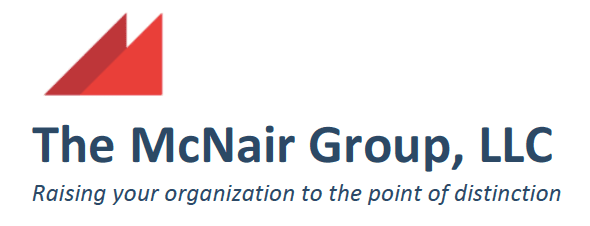The McNair Group
provides a wide array of training and consultative services focusing on improving organizational culture….from customer service and internal board level and staff teamwork, to assessments, leadership development, strategic planning and numerous others. At The McNair Group, we pride ourselves on flexibility and listening first to our clients needs. We then work to design programs that meet and exceed those needs and expectations. Our programs are described below:

Review of Policies, Procedures & Key Indicators for “Enhancers and Inhibitors"
Hiring and Retention Practice Assessments
- Service Creators vs. Service Partners
- Proper Pre and Post-Hire Establishment of Expectations
- Retention Goals
- Recognition Programs
- Performance Measures
- Exit Interviews
Training Programs: Orientation and Refresher for Frontline Associates and Team Leaders
Program Scope
Creating Relation-Sensations A complete overview as to the Why’s and How’s of Distinguishing Customer Service
The Silent Slap What tone of voice and body language can do….even if the words are right
Mirror…Mirror
A self assessment with tips on improving the image you project
The Circular Call Maximizing the telephone experience
Aloe for the Burning Customer Practical solutions for impractical demands
Hello and Goodbye Focus on the importance of first and last impressions
Lip Service Two ears and one mouth. Begin with Active Listening
You and Your Team A program of team benefits, roles and relational exercises
Change – Who Asked for It? Learning not only to adapt, but to lead in times of significant change
Spinning the Web Self assessment and opinion mapping exercises to help identify gaps in the expected vs. the perceived
My Mission and Me Building commitment to organizational mission and vision statements through development of personal service statements
Right vs. Right: Ethics on Trial Understanding the impact of morals, principals, and the conflicts of “right vs. right” within the context of one’s intuitions, judgement and work applications
Service Measurements and Analyses
- Gap Analyses: interview and survey information is utilized to highlight “disconnects” in perceptions, desires and actions
- Customer Service Surveys: mail, telephone, electronic, interviews and focus groups
- Mystery Shopper & Teleshopper Trends and Statistics
- Employee Surveys: mail, electronic, focus groups, and feedback forums
- Site and Facility Assessments: Sights, Sounds, Smells
- Exterior Impacts: Parking, Signage, Lighting Landscaping, Entries/Access (smoking sections)
- Interior Statements: Signage, Greeting, Guest Areas (lobbies, restrooms, etc.)
- Frontline Employee Workspace: “Onstage & Offstage”
Board Governance
- Board and staff retreats
Course Summaries
Each of the seminars described below lasts two or three hours. Most are designed for supervisory and frontline personnel, unless designated otherwise.
Creating the Exceptional Experience
In this introductory seminar, your will learn why exceptional customer service is so important in today’s competitive environment. After sharing some of your own best and worst experiences as a customer, you will hear some sobering facts about the state of service in America today. You will discuss five key service attributes that all customers, internal and external, want and need. Furthermore, specific frontline skill sets will be taught and practiced for making lasting first impressions, relationship building through empathy, fundamentals of working a ‘zone’, and numerous other key customer connectors. Note: This session is designed for frontline and supervisory staff.
Dealing with Difficult Customers
This seminar brings customer service home to the personal level. After sharing some of the participants’ experiences in dealing with challenging customer situations, you will learn some tips on dealing with emotional behavior. You will discuss the importance of attitude, self-talk, and the Disney concept of onstage vs. offstage. Finally, you will learn the importance of service recovery strategy…what typically can bring down the customer experience and what tools do you have to “recover.” We will review the ‘Trigger Words’ that most often lead us down a dangerous path, and how to begin using more calming and empathetic responses. Note: This session is designed for frontline and supervisory staff.
Change: Leading Change – Action vs. Reaction
Change is inevitable, but the rapid-fire nature of it in today’s workplace is staggering. Whether it’s driven technologically, politically, economically, or socially – we must learn no only to adapt well to it, but to lead our organization positively through it. To do this, we must understand the attitudinal cycles of change, and how to effectively communicate with our employees before, during and after the process. Furthermore, you will receive tools to teach them to be leaders of change so that we can maximize our organization’s potentials. The session is interspersed with exercises to work through actual situations of organizational change for improved planning, communications, and implementation.
Effective Communications: My Way
Conflict is a part of everyone’s life. We can’t eliminate it…nor would we necessarily want to since new insights and growth can emerge from well-managed conflict. Healthy conflict management is a necessary part of work, family life, and even play. In this seminar you will learn an entire range of conflict management strategies and how to utilize each one. You will identify your own preferred style of managing conflict as well as alternative styles, which might work for you. The seminar also will introduce you to the basic principles of effective communication.
Effective Communications: Getting and Giving Feedback
This seminar deals with three critical communication challenges—getting good information from others, getting your ideas across, and recognizing positive results. Communicating clearly and convincingly is neither an inherited ability nor an elaborate art form; it is a learned skill developed thorough planning and practice. This workshop will show you how to avoid making common and costly mistakes based on poor information. You will learn skills to make you highly competent at presenting ideas, giving directions, and explaining procedures. Finally, you will get practical tips on how to motivate people to achieve, grow, and contribute in a way that costs virtually nothing. Note: This session is designed for frontline and supervisory staff.
Ethics: Rightly Making Wrong Decisions
This interactive seminar provides the tools for decision modeling to help produce best ethical outcomes. This is a two-part series dedicated to defining ethics, while providing instruction on systematic processes for making decisions – decisions that are less influenced by the emotional and time-pressured conditions of the immediate situation. You will learn how to integrate ethics decision making into your mission and values, and you will have tools to help you educate your staffs to avoid ethical liabilities.
Team Building: Building from the Inside-Out
“Coming together is a beginning. Keeping together is progress. Working together is success.” These words of John C. Maxwell describe both the importance and the benefits of teamwork. In this fun and active session, you will participate in a series of exercises designed to teach specific team skills. In addition to learning about team leadership traits, you will also learn to identify the different types of teams, and what makes them excel…as well as what to do when they bog down. Note: This session is designed for frontline and management staff.
Honest Conversations: ‘we need to talk’
Effective communication continues to be one of the most vexing challenges in organizations today. As a manager, your communications with other leadership and staff is paramount. In this seminar you will learn the common paths and most often made mistakes associated with co-worker communications. More importantly, you will learn techniques to examine and put into action specific skills that will vastly improve the quality of your communications and relationships.
Negotiating Agreement: getting to YES
Everyday our lives are full of negotiations. Unfortunately, negotiation is typically a lose/lose proposition for the parties involved – each walks away feeling that something was given up. Based on studies from the Harvard Negotiation Project, you will learn to develop better outcomes – leaving you and others with an improved since of resolve.
Motivating Self and Staff: proven tools and techniques
It’s long been proven that an energized staff is a more productive staff. We also know that our employee relations directly link to our relationships with those we serve as our customers. First and foremost — to improve staff motivation and morale – it starts with “me.” In this session, we’ll examine our personal motivation and morale, and how it translates to our co-workers. We’ll then step through methodologies that will systematically and creatively build a more motivated team.
Generational Differences: turning barriers into bridges
Managing and motivating the different generations in today’s workplace is new and different for all of us. New things are being questioned such as…why do they not seem to respect authority, where’s the work ethic, why should I do it this way, what’s professional dress code mean, what language is acceptable, what’s up with performance evaluations, what incentives are best used, what support is most needed, etc, etc. Come learn what others are doing, and what things you can do to build generational bridges.
Time: When 24 hours ain’t enough
Time is the nemesis in every manager’s day. Whether it’s prioritizing, delegating, and/or having timely follow-through…we can find ourselves spinning in unproductive circles. Learn techniques for better organization and time management that will allow for more effective leadership. This session combines exercises in priority setting, quadrant planning, and delegating with individual action steps for a behavior change.
I-Countability
Teaches the “I-factor” in reaching higher levels of responsibility and accountability. It helps staff members not only to accept circumstances, but also to take an active role in directing desired outcomes for the betterment of themselves and the organization. We will review organizational specific outcomes that are falling short of goal, and determine the “I-factor” that will make a positive difference.
Understanding our Diverse Workplace
Read the statistics. Four generations in the workplace; rapidly growing Hispanic-American and other minority segments of the population; women in the workforce in ever increasing numbers. Whether it be race, gender, age, religion, physical ability, education level, one of a dozen aspects of diversity, today’s leader needs to know how to manage a workforce that is much different than in our parents and grandparents’ day.
This session will provide leaders with the understanding and the skills to deal with this vital area.
